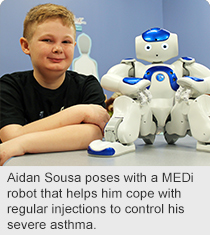
February 20, 2015
Story by Janet Mezzarobba; Photo by Colin Zak
Like most children his age, nine-year old Aidan Sousa hates needles.
As a regular patient at Alberta Children’s Hospital in Calgary, Aidan receives injections every two weeks to help control his severe asthma and, until recently, it has never been an enjoyable experience.
Now, four childlike robots are being used to comfort and entertain young patients such as Aidan during stressful medical procedures at Alberta Children’s Hospital.
A first in Canada, the two-foot-tall robots, named MEDi (Medicine and Engineering Designing Intelligence), are programmed to mimic the actions of a child and to calm apprehensive patients with small talk and high-fives during procedures, such as vaccinations and blood tests.
“The robots not only provide a distraction and give instructions on how to cope, but they also help improve the dynamic between child and parent,” says Dr. Tanya Beran, Professor of Community Health Sciences at the Cumming School of Medicine, University of Calgary, who helped program the robots.
“Parents know their child is nervous, which makes them nervous. MEDi gives instructions that help join parent and child together in a common action,” she says.
This was the case for Aidan and his mother, Sheila, when MEDi was in the room during a recent hospital visit.
“All Aidan could talk about after his injection was the robot,” says Sousa.
“The procedure wasn’t nearly as uncomfortable with MEDi in the room. Not only did it calm him down, but it helped me knowing Aidan was preoccupied and interested in something other than his treatment. It made the entire experience so much easier.”
Margaret Fullerton, Senior Operating Officer of Alberta Children’s Hospital, is happy to have the MEDi robots at the facility.
“Hospitals, even bright and friendly hospitals like this one, can put children on edge, especially if they are here for a procedure that might involve some discomfort,” she says.
“We’ve been testing the MEDi robots here for almost three years and it has become quite clear that this technology significantly improves the health care experience for our young patients and their parents and caregivers. The Alberta Children’s Hospital is fortunate to have access to the first robots in Canada specifically programmed to help children manage painful or stressful medical procedures. It’s a useful – and very cool – technology.”
In a recent study conducted by Alberta Health Services and the University of Calgary, 57 children between the ages of four and nine were able to interact with MEDi while receiving their seasonal influenza vaccination at Alberta Children’s Hospital.
The study showed children who interacted with the robots reported 50 per cent less pain compared to youngsters who received their vaccination with little or no distraction.
“These results show the potential and benefits for using robotics to help manage a child’s pain while having a medical procedure done,” says Dr. Beran.
“Robots can be used during blood tests and IV starts and other uncomfortable procedures, such as stitches or a fracture sets. It can even be used for procedures that aren’t painful but cause distress for children, such as X-rays. The opportunities are endless.”